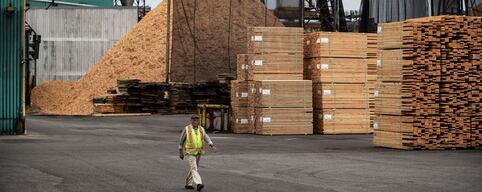

In a significant move towards enhancing domestic biomass production capabilities, EcoTech, a leading producer and seller of wood chips and pellets, has announced a major expansion of their manufacturing facility. This ambitious project is being financed through a 30 billion KRW project financing initiative, focusing on developing infrastructure capable of producing 60,000 tons of unused forest biomass wood pellets annually. This expansion is set to play a vital role in the national effort to promote sustainable energy production.
EcoTech's expansion plan aligns seamlessly with government policies aimed at achieving carbon neutrality while advancing the RE100 campaign, which targets gaining 100% renewable energy by businesses. A key aspect of the government’s strategy includes reducing subsidies for electricity generated using imported biomass pellets, thereby encouraging domestic production. By adjusting financial incentives, the government also intends to reduce guaranteed profits for facilities that rely on imported wood pellets, thus strengthening the local market for these products.
One of the main challenges facing the sector is the low self-sufficiency rate of domestic wood pellet production. Data from the Forest Service indicates that as of 2024, domestic production of wood pellets is expected to reach only 619,713 tons, in stark contrast to the 2,801,558 tons imported. This discrepancy results in a troubling self-sufficiency rate of just 18.1%, clearly underlining the urgent need to bolster domestic production capabilities.
The factors contributing to this low self-sufficiency rate include the lack of investment in the necessary production infrastructure and an over-reliance on imports to meet energy demands. By expanding their facility, EcoTech intends to help bridge this gap, contributing significantly to enhancing the larger industrial capacity needed to achieve a more balanced and self-sufficient biomass market in the country.
Additionally, addressing these challenges will require coordinated efforts by both the private sector and government agencies. Investment incentives, technological innovations, and policy support will be critical in overcoming the obstacles to achieving higher rates of local wood pellet production.
EcoTech’s efforts to expand its manufacturing facility represent a crucial step towards addressing these challenges by increasing the production capacity of domestic biomass. This initiative is not only timely but necessary in order for the nation to work towards greater self-sufficiency and reduced dependency on imports.
The economic and environmental implications of EcoTech’s project are significant. Economically, increasing domestic production of biomass pellets offers potential job creation and stimulation in the local economy. It also creates opportunities for other domestic suppliers and manufacturers to enter the market, fostering a competitive and sustainable local industry.
Environmentally, this initiative contributes to reducing the nation’s carbon footprint by minimizing the need for transportation of imported pellets, which involves considerable fossil fuel consumption. By promoting the use of sustainable energy sources through local production, the project supports broader environmental objectives, including reduced reliance on nonrenewable energy sources.
The strategic alignment of EcoTech’s expansion with national policies highlights a unified effort towards attaining carbon neutrality and advancing sustainable practices. The project not only promises to bring economic benefits through enhanced domestic capacity but also supports national goals aimed at reducing carbon emissions and promoting renewable energy sources.
In conclusion, EcoTech's biomass facility expansion serves as a pivotal development in the domestic biomass industry, showcasing the convergence of government policy support and private sector initiative in driving the country toward a more sustainable energy future. This project demonstrates the positive impact of strategic investments in renewable energy infrastructure and underscores the importance of collaborative efforts in addressing global environmental challenges.



